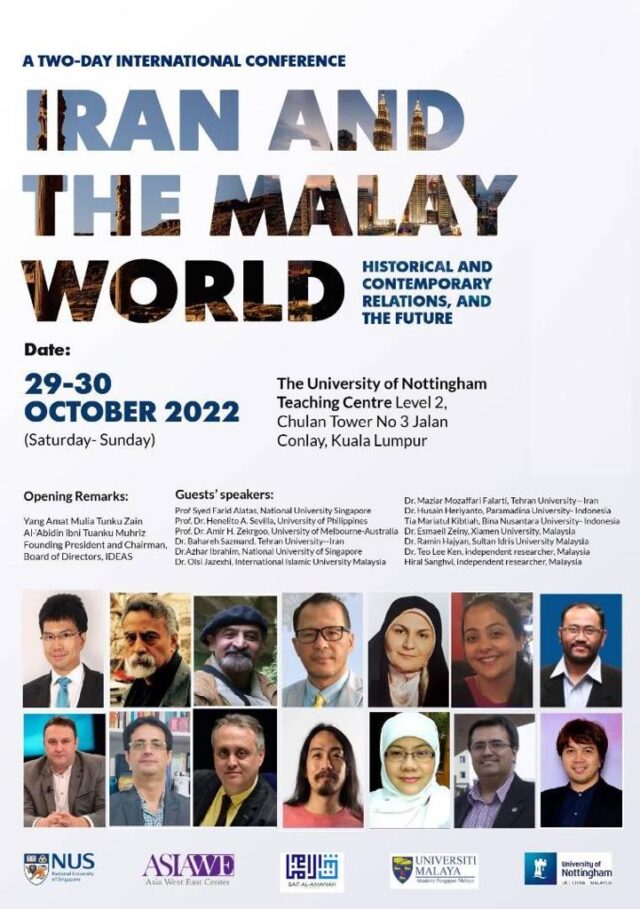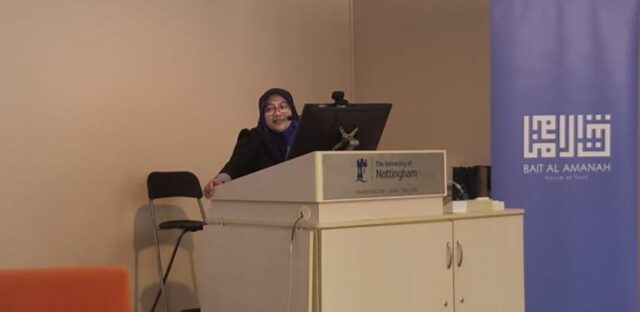BINUS IR Lecturer’s Presentation on Iran-Southeast Asia Cooperations in Nottingham University, Malaysia

Lecturer of International Relations at Bina Nusantara University, Indonesia, Tia Mariatul Kibtiah was invited as one of the speakers at the international conference forum for Middle East and Southeast Asian experts at Nottingham University, Malaysia. The event was held from 28 to 31 October 2022 by the Asiawe Center, Malaysia, which focuses on research in the academic field on the relationship between Iran and Southeast Asia. The speakers came from various universities from various countries, namely Prof. Syed Farid Alatas (NUS), Prof. Dr. Henelito A. Sevilla (University of the Philippines), Prof. Dr. Amir H. Zekrgoo (University of Melbourne Australia), Tia Mariatul Kibtiah (BINUS University and Doctoral candidate at Padjadjaran University, Indonesia), Dr. Bahareh Sazmand (Tehran University), Dr. Azhar Ibrahim (NUS, Singapore), Dr. Olsi Jazekhi (International Isamic University Malaysia), Dr. Maziar Mozzaffari Falarti (Tehran University), Dr. Husain Heriyanto (Paramadina University, Indonesia), Dr. Esmaeli Zelny (University of Malaysia), Dr. Ramin Haijan (Sultan Idris University of Malysia), Dr. Teo Lee Ken (Malysia), Hiral Sanghvi (Malaysia).

On that occasion, Tia brought a topic with the title “Cooperation Iran-Southeast Asia under the US Sanctions”. The article explains about Iran’s decision to approach Southeast Asia when Iran’s economic condition slumped due to US sanctions. The research conducted by the author is limited to only three countries, e.g., Indonesia, Malaysia, and Thailand as the countries with the best economies in the Southeast Asia Region based on GDP (Gross Domestic Product). With the theoretical framework of economic diplomacy carried out by Iran to Southeast Asia, Tia (2022) in her article explains that Iran has carried out a lot of cooperation with Southeast Asia, especially in the fields of trade, investment, and the tourism sector in addition to cooperation in the fields of culture and education.
In her presentation, Tia explained about Indonesia’s bilateral relationship with Iran during the administration of President Joko Widodo, which was more intense than the previous administration. President Jokowi opens more opportunities for economic diplomacy carried out by Iran against Indonesia. For example, in the energy sector, Pertamina, an oil company owned by Indonesia, accepted Iran to continue purchasing Liquefied Petroleum Gas (LPG) from Iran for more than 500 thousand metric tons. Pertamina also buys crude oil from Iran and cooperates in the gas sector. Indonesia and Iran will also form a joint venture to build a refinery or processing crude oil into finished oil in East Java with a total value of 5 billion US dollars. Meanwhile, for cultural and educational cooperation, Indonesia and Iran have had very good relations for a long time. Even some Indonesian cultures are influenced by Persian culture.

Meanwhile, relations between Iran and Malaysia are steadily improving, especially in the field of economic cooperation. In 2017, Iran-Malaysia trade continued to increase to reach 320 million US dollars. Many Malaysian companies are interested in investing in Iran such as in the fields of palm oil and crude oil. Just like Indonesia, Malaysian oil companies Petronas and Amona also cooperate with Iranian gas companies.
In the field of education, Iran and Malaysia strengthen cooperation in the fields of research, preparation of scientific cooperation programs and exchange of professors and students. For example, Universiti Teknologi Malaysia (UTM) has signed a Memorandum of Understanding on a joint research project to find the root causes of air pollution in the capital cities of both countries and find ways to address them. Other research topics are also carried out by Malaysian and Iranian universities such as in the fields of sociology, culture, and technology.

Iran-Malaysia cooperation is more on ideological similarities, but relations with Thailand because of the advantages of the geographical location of the trade route. Iran has adequate infrastructure in the port sector and the railway corridor between the South and North as the most stable and safe area, can be the best gateway for the development of trade relations between East Asia and Thailand with the Central Asia Region, the Caucasus and Europe. Iran sees that there are no obstacles in establishing cooperation with Thailand from various aspects. Iranian President Hassan Rouhani assessed that Iran-Thailand could also cooperate in counter terrorism, violence, extremism. From the Thai side, they also see Iran as a strategic area to connect Thailand with the Central region, West Asia and Europe.
Iran’s decision to approach Southeast Asia under pressure from the United States is correct. Iran was able to survive and improve its economy. Southeast Asia is the most economically viable region compared to other regions. Southeast Asia is also free from the intervention of any party in its foreign policy.
